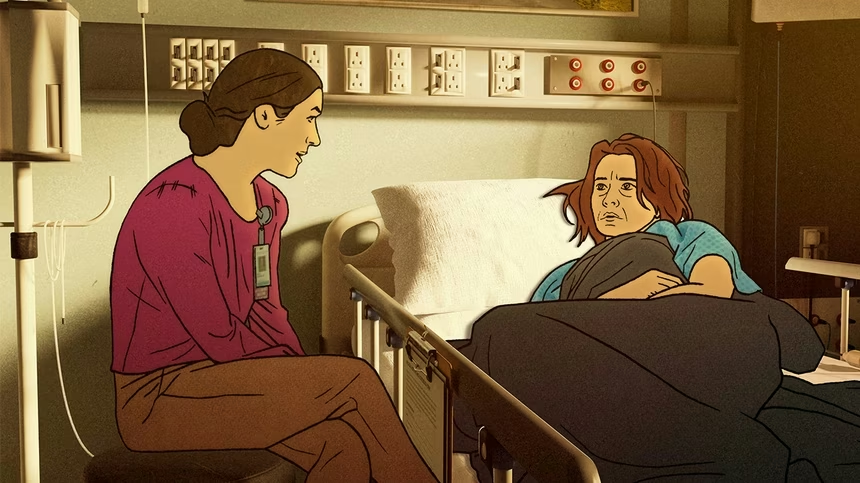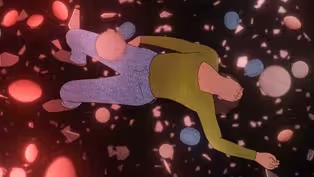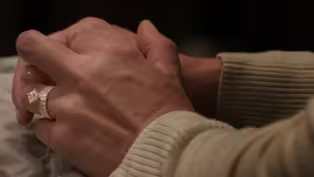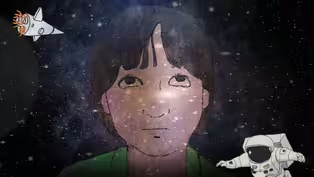
The Opioid Trilogy, Episode 2: Do No Harm
Special | 15m 10sVideo has Closed Captions
One woman’s journey from heroin addiction to healing, recovery, and hope.
Do No Harm, the second installment of The Opioid Trilogy, follows Raina McMahan’s 17-year struggle with heroin addiction and her path to recovery. After years of failed treatments and isolation, a new approach to care offers her a future rooted in connection, not punishment. Her story challenges stigma and offers hope in the face of crisis.
Problems playing video? | Closed Captioning Feedback
Problems playing video? | Closed Captioning Feedback

The Opioid Trilogy, Episode 2: Do No Harm
Special | 15m 10sVideo has Closed Captions
Do No Harm, the second installment of The Opioid Trilogy, follows Raina McMahan’s 17-year struggle with heroin addiction and her path to recovery. After years of failed treatments and isolation, a new approach to care offers her a future rooted in connection, not punishment. Her story challenges stigma and offers hope in the face of crisis.
Problems playing video? | Closed Captioning Feedback
How to Watch Independent Lens
Independent Lens is available to stream on pbs.org and the free PBS App, available on iPhone, Apple TV, Android TV, Android smartphones, Amazon Fire TV, Amazon Fire Tablet, Roku, Samsung Smart TV, and Vizio.

The Misunderstood Pain Behind Addiction
An interview with filmmaker Joanna Rudnick about making the animated short PBS documentary 'Brother' about her brother and his journey with addiction.Providing Support for PBS.org
Learn Moreabout PBS online sponsorshipMore from This Collection
Films that provide an unflinching look at healthcare and mental health in the U.S.
The Opioid Trilogy, Episode 3: Coming Home
Video has Closed Captions
A Milwaukee woman’s journey from addiction to healing reshapes recovery for her community. (15m 13s)
Video has Closed Captions
Camp Widow is a place for widowed people to find both camaraderie and unexpected joy. (15m 21s)
Video has Closed Captions
A filmmaker's brother opens up about his recovery from opioid use disorder. (14m 21s)
Providing Support for PBS.org
Learn Moreabout PBS online sponsorship(birds chirping) (birds continue chirping) (gentle music) - [Raina] My childhood was atypical.
(gentle music continues) I grew up in the country.
- Hey Tommy, come look at these bugs.
- So me and my brother spent a lot of time going outside (gentle music continues) and we were walking down this hill.
And we turned around.
- [Tommy] Hey, Raina, look.
- [Raina] And there was a baby deer.
(gentle music continues) And the baby deer let us come up and, like, pet it.
(gentle music continues) So in a lot of ways it was like a magical childhood.
(gentle music continues) - [Crew] Common markers take one.
- It's always a lot to ask people to tell their story and there's some things that you just don't wanna relive.
(tense music) (machines beeping) But I will share my story because what almost killed me also saved me.
- Hi Raina, my name is Dr. Wakeman.
I'll be taking care of you.
- [Raina] Because if I hadn't have met Sarah, I don't think I ever would've stopped.
(soft music) (soft music continues) (door rustles open) ♪ A sign ♪ - Hey, Raina, is that you?
Grab me a beer.
♪ Anymore ♪ - I don't think that they would ever define themselves as alcoholics but looking back, you know, my parents definitely were drinking.
(people shouting) (glass breaking) Their voice would change, their tone would change, (people shouting) And I would just wanna get away from it because it was unpredictable.
(birds chirping) (bell ringing) When I started going to school, I remember just feeling, you know, very outta place and very uncomfortable and not like other kids.
(people chattering) That's when I started turning to substances and I remember feeling more at peace and calm and not so uncomfortable.
(uneasy music) I started getting into a lot of trouble at home.
(people yelling) I could hear them fighting about me downstairs.
(people yelling) (upbeat music) And I threw some (beep) in a backpack (upbeat music continues) and hitchhiked down to Portland.
(upbeat music continues) You know, I came up with a lot of creative ways to come up with money.
I would go up to the Portland Rose Garden and I would cut roses (upbeat music continues) and I would sit in front of this strip club and the guys that were going in there, I would say, hey, for a few bucks, you can give the dancers a rose instead of money.
(upbeat music continues) I just always would have to leave before the dancers got out.
- Hey Rose girl, money, not roses.
(train blowing) - [Raina] There was a lot of kids that were like hopping trains and going to different cities.
(train rumbling) So we hopped a train to go to Seattle.
(train continues rumbling) (traffic humming) They all were talking about how they were gonna get heroin.
- Separates from you and just float away.
- And they were like, are you sure you don't wanna do it?
And I was like, no.
(gentle music) But when I saw my first friend do it, (horns honking) I was like, okay, I'll try it.
(gentle music continues) This is what I've been after.
This is the feeling I've wanted for so long.
(gentle music continues) That feeling of being okay in my body.
(gentle music continues) (gentle music continues) (gentle music continues) Your brain is just constantly, like, this will make you feel better.
This will make you feel better.
This will make you feel better.
And you can't stop thinking about it.
(gentle music continues) After a while, you just do it to feel normal.
(quiet music) There's this thing that a lot of people reference in the recovery world, that the opposite of addiction is connection.
There was this study done where this guy took a bunch of rats, put them in a cage, isolated them and gave them drugs, and they all became addicted.
(gentle music) Then he built Rat Park where there's things for rats to play with.
There's places for rats to have sex and eat food and also drugs.
But since there was all these other options now, they didn't become addicted to the point of killing themselves.
(gentle music continues) I kept looking for Rat Park.
(gentle music continues) When I look back, I was the queen of geographical cures.
(gentle music continues) If I leave this town, I'm gonna feel better.
If I don't hang around this person, I'm gonna feel better.
If I have this job, I'm gonna feel better.
But eventually I would always start using again.
When I found myself on the streets in Boston, years, it just feels like years just go by in an instant.
(brakes squeaking) - [Announcer] Are drugs and alcohol ruining your life?
- [Announcer] Are your parents kicking you outta the house?
- [Announcer] Help is a phone call away.
- [Announcer] Individuals receive personalized care in a safe and nurturing environment.
- [Announcer] It's not your fault.
You can stop the insanity.
- [Announcer] 888-520-CURE and end your addiction now.
- [Raina] I was 17 the first time that I went to treatment.
You go for 30 days, they give you a little piece of paper, you graduate, off you go.
It didn't work for me.
(wind blowing) - No.
- Eventually I decided to try methadone.
It took me sometimes two hours one way to get there in the morning, and if you don't show up there by 10 o'clock, you show up at 10 o'clock and 30 seconds, the door shuts in your face.
(uneasy music) Then you don't get your dose that day.
Then you end up being sick or you end up using to get through.
(uneasy music) - [Reporter] Opioids are now the biggest drug epidemic in American history.
- [Reporter] Overdoses up, emergency services overwhelmed.
Another family burying-- - [Reporter] Suspected heroine or opiate related deaths in Massachusetts-- - [Reporter] Almost half a million Americans have died from an overdose, and the majority of those involve opioids.
(uneasy music continues) - A lot of people were starting suboxone.
So I went to this doctor and he sits you down - How old are you?
- [Raina] and asks you all these questions.
- How many times have you tried-- - [Raina] What age did you start using?
Have you ever shared needles?
How many detoxes I had been to.
- Just think of all the taxpayer dollars that have been spent on you and you're still here.
(uneasy music continues) - [Raina] I thought about driving up to the Tobin Bridge and hurling myself off.
(uneasy music continues) So I'm just waiting to feel better and I get sicker.
(uneasy music continues) And that doctor told me, you must be allergic to Suboxone.
(uneasy music continues) See you later.
(doors closing) (uneasy music continues) At this point, I was so terrified to go to doctors, (uneasy music continues) but I started to feel sick.
(sirens wailing) (radio chatter) (uneasy music continues) (person coughing) That was the first time they told me I had endocarditis.
- You have endocarditis.
- [Raina] It's a heart infection from using IV drugs.
It's kind of like sepsis.
It's an infection in your blood, but it ends up stopping in your heart.
I said, you know, what's the treatment for this?
- [Doctor] You're gonna have to be on antibiotics.
- Six weeks of IV antibiotics, and there's only one place that we can send you.
(uneasy music) No other place will take you because of your addiction history.
(uneasy music continues) (uneasy music continues) I saw a man in his bed picking up piles of his own (beep) and throwing it on walls.
(uneasy music continues) People are also selling drugs there.
(uneasy music continues) (uneasy music continues) So it was a really scary place.
(uneasy music continues) When I got discharged from there, I think I felt just even more, like, damaged and broken.
(uneasy music continues) I'm just gonna continue to use until I die.
(uneasy music continues) (person coughing) (woman crying) (uneasy music continues) (uneasy music continues) (people crying) (buzzing) (ambulance siren) After a couple months, I started to get those exact same symptoms.
(machines beeping) That's when I met Sarah.
- Hi Raina, my name is Dr. Wakeman.
I'll be taking care of you.
(gentle music) - I was a brand new attending doctor.
I remember her looking sick and scared and you know, mistrustful, for good reason.
(gentle music continues) I think an important thing that I tried to frame for Raina from the start is that I was gonna be her doctor whether or not she continued to use substances and that those things were not conditional.
- It'd be okay.
(gentle music continues) - [Sarah] She tried all these different treatments and she had been made to feel like, there's something innately wrong with her, that she was never gonna get well.
The one time she'd had experience with buprenorphine, she'd been given it the wrong way and then told she had an allergy, which was not true and kept her from accessing treatment for a long time.
(gentle music continues) And the reality was that the treatment system had failed her like it fails so many people.
(gentle music continues) - I remember just telling her, I will absolutely not go back to that facility.
You can discharge me to the streets, but I am not going back to that facility.
And Sarah backed me.
- We worked really hard to push for her to go to just a garden variety skilled nursing facility.
I think she jokingly called it an old folks home.
(birds chirping) (gentle music) (people chuckling) - [Raina] And this is where I think the Rat Park comes into play, right?
(gentle music continues) Felt like I had a lot of grandma and grandpas all of a sudden.
(gentle music continues) People were really, like, curious about my story and really welcoming.
(quiet conversation) The other thing that Sarah really advocated for was for me to attend addiction treatment while I was in the medical facility.
- [Treatment Leader] Get better and to recover.
- So that was the first time in a while that I had any significant amount of recovery.
(upbeat music) They had prom, and obviously I didn't get to go to prom.
(upbeat music continues) I had two prom dates actually.
(Raina laughing) - [Sarah] We know using substances is a tremendously powerful way to manage in times of stress and trauma.
(camera clicking) So how would making more bad things happen to a person who's already hurting help them get better or help their life get better?
(upbeat music continues) Usually it has the exact opposite effect.
One of the greatest catalysts for change is hope.
(upbeat music continues) (people chattering) (gentle music) - [Raina] When I talk to people about my addiction, a lot of people will say like, oh, well you're just blaming it on the system.
But the thing is, is I blamed it on myself for so long.
- [Miles] Oh, mama.
- [Raina] Miles.
- [Miles] Mama.
- Miles.
- [Miles] Mama.
(gentle music) - Come on, Weston.
(gentle music continues) (Raina laughs) You sure?
(gentle music continues) Are you ready?
- Yes.
- Are you sure?
- [Miles] Put it on to my rocket ship.
(gentle music continues) - [Raina] People out there don't wanna be out there.
They don't.
(gentle music continues) (gentle music continues) (gentle music continues) (gentle music continues)
Support for PBS provided by:


















